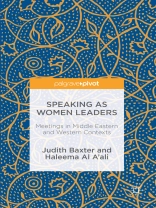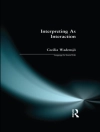This book offers new insights on how senior business women in Middle Eastern and Western companies use language for effective leadership in their respective management meetings. The book explores six case studies of women leaders, three in UK companies and three in a Bahraini company. The authors analyse meeting and transcript data to show that, in both cultural contexts, the women negotiate a range of gendered discourses such as ‘hierarchy and status’ and ‘masculinisation’ in order to manage their teams with authority and skill. The book challenges received wisdom about the opportunities and constraints each cultural context offers women in public life. While the UK women are constrained by chronic change and uncertainty in performing their roles effectively, the Bahraini women are far better supported by their bosses, yet are constrained by patriarchal assumptions of what constitutes effective leadership. The book demonstrates the use of Feminist Poststructuralist Discourse Analysis(FPDA), which is applied by scholars worldwide yet has relatively few published models of practice.
Table of Content
Chapter 1: Women Leaders in the Middle East and West.- Chapter 2: The Two Case Studies.- Chapter 3: Women Leaders in the Middle East.- Chapter 4: Women Leaders in the UK.- Chapter 5: The Discursive Positioning of Women Leaders.- Chapter 6: Gender and an ‘Effective’ Language of Leadership.
About the author
Judith Baxter is Professor Emeritus of Applied Linguistics at Aston University, UK. She has published a number of influential monographs including
Double-voicing at Work: Power, Gender and Linguistic Expertise (2014),
The Language of Female Leadership (2010) and
Positioning Gender in Discourse: A Feminist Methodology (2003). Her work regularly features in the media.
Haleema Al A’ali is Assistant Professor at the University Of Bahrain, Kingdom of Bahrain. Her research focuses on sociolinguistics, language, gender and leadership, and language in the workplace.












